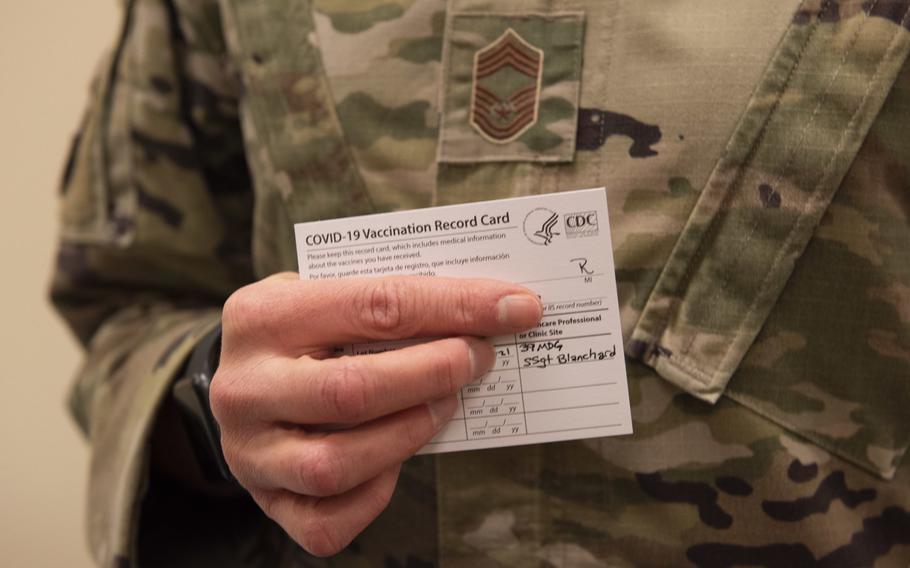
A U.S. airman holds a COVID-19 vaccination card during the first phase of immunizations on Jan. 8, 2021, at Incirlik Air Base, Turkey. Travelers to Germany from Turkey only have to quarantine for five days as of May 13, 2021, and travelers from the U.S. don't need to quarantine at all if they are fully inoculated or can show they have recovered from the virus. (Ryan Lackey/U.S. Air Force)
Stars and Stripes is making stories on the coronavirus pandemic available free of charge. See more staff and wire stories here. Sign up for our daily coronavirus newsletter here. Please support our journalism with a subscription.
KAISERSLAUTERN, Germany — People traveling to Germany from the U.S. do not need to quarantine if they are fully vaccinated against coronavirus, can show they have recovered from COVID-19 or produce a negative test result, the health ministry in Berlin said Thursday.
“Proof of vaccination or of recovery from COVID-19 can replace a negative test certificate and exempt you from quarantine on entry,” if arriving from a country designated a risk area for the virus by Germany’s infectious diseases agency, the Robert Koch Institute, the German Health Ministry said on its website.
A negative antigen or PCR test is still required by airlines before traveling, the health ministry said. Antigen tests must be no more than 48 hours old and PCR tests no more than 72 hours old on arrival in Germany.
The rules apply to anyone who has spent 10 days immediately preceding travel in the U.S. or any other risk area.
The U.S. was lowered from a “high incidence” to “risk” area by RKI in early March as vaccination campaigns picked up across the country. The risk categorization is the lowest health threat level in RKI’s ranking system.
As of Tuesday, 46% of Americans had received at least one dose of a coronavirus vaccine, the fourth-highest vaccination rate in the world after Israel, the United Kingdom and Bahrain, according to data compiled by Oxford University’s Our World in Data team.
People who have been inoculated with any of the three vaccines being used in the U.S. — Johnson & Johnson, Moderna and Pfizer-BioNTech — are covered by the new rules, a health ministry spokesman said. The Johnson & Johnson vaccine is a single-dose shot, and the Moderna and Pfizer vaccines require two shots about one month apart. The two-dose vaccines provide full immunity about two weeks after the second shot, and the J&J vaccine gives significant protection 29 days after the shot, clinical trials have shown.
Several countries with a U.S. military presence, including Afghanistan, Belgium, Djibouti, Poland and Romania also are considered risk areas by RKI and would be covered by the same, eased entry rules.
However, travel to Germany remains severely restricted, except for Germans and citizens of European Union countries, Switzerland, Norway, Iceland and Liechtenstein, and residents of a handful of countries with few or no cases of the virus, including South Korea. Americans living in the U.S. are not allowed to enter Germany for leisure travel, the German Interior Ministry said on its website, which was last updated on Wednesday. But “the list of non-EU countries is regularly reviewed and updated as necessary,” it said.
Passengers arriving in Germany from high incidence countries are required to quarantine for five days, and those traveling to Germany from 10 countries where coronavirus variants are known to be circulating must quarantine for 14 days, with no possibility of testing out.
Brazil, India and eight countries in southern Africa are on RKI’s list of countries where variants are known to be circulating. France, a popular travel destination for many U.S. service members and their families in the Kaiserslautern area, is a high incidence country. So are Bahrain, the Netherlands and Turkey, all of which house U.S. military installations.
The Czech Republic, which borders the German state of Bavaria, where some 38,000 U.S. troops, contractors and their families live, was lowered from high incidence to risk area in early May.
zeitvogel.karin@stripes.com Twitter: @stripeszeit